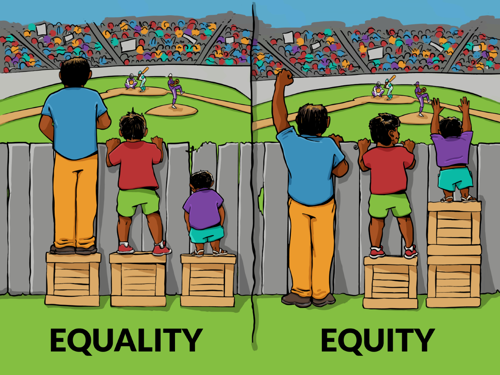The current desire to create inclusive and equal workplaces means that Chief People Officers face increasing pressure to support employee diversity in all forms.
With nine protected characteristics, DEI (Diversity, Equity, and Inclusion), talent and L&D teams often tell us they cannot afford to commission bespoke programmes to advance high-potential Black and Asian, female talent when other employee groups do not receive specific interventions.
Because the business case for race and gender is complex and nuanced, it is easier to design a catch-all leadership development programme for everybody who qualifies. This supports the commonly held belief that a solution for everyone shows there’s equality of opportunity. The truth of the matter is, women need equitable opportunities, not equal ones.
This cartoon by Angus Maguire explains the difference between the two.

By assuming the leadership development needs of all men and women (or for that matter, women of all ethnicities) are the same, we’re letting down the groups which need specific help most. In our opinion, an equitable learning opportunity is one which directly addresses disadvantage. Tailoring resources and solutions to reduce the gaps which exist is the best way to level the playing field.
There’s a promotion gap
Globally, more young women are leaving University than men. They are graduating with higher qualifications and in accountancy, advertising and law, the numbers of women at entry level outweighs the numbers of men. By mid-management, this pattern reverses. According to LeanIn, for every 100 US men promoted to first level manager status in 2022, only 87 white women were promoted and just 82 women of colour.
Want to get ahead? sponsor a woman
Women also fall behind when it comes to receiving developmental feedback and sponsorship opportunities. Sylvia Ann Hewitt’s research shows men are 56% more likely to be sponsored than women. Our survey shows as many as 94% women don’t receive feedback on how to navigate the organisation. Only 5% receive feedback on how to get promoted and 10% feel their company uses a transparent promotion process.
A wonderful way to address these challenges is by encouraging all senior leaders to sponsor someone different to them (gender or ethnicity). By helping women of all ethnicities navigate the organisation, you’re showing them how to thrive.
Women are confident they have what it takes to reach the top
They are not always clear on how to make it happen. 88% of participants on our executive leadership development programme feel confident they will achieve a C Suite role, yet only half of the cohort felt that women could advance to the highest levels of their organisation.
There are concerns that women only or ethnic only leadership development programmes fly in the face of equality as one group is favoured over another. Women only leadership development programmes provide a safe space to discuss the barriers and treatment women face at work. They provide an opportunity to ask for help navigating the masculine leadership style prevalent in many global organisations, and a forum for women to hone their leadership practice with the support of their peers in a way they can’t when men are present. As one of our delegates put it, women only spaces show them “different ways of thinking and acting are possible, and my skills around leadership and collaboration are valuable and worth being proud of”.





